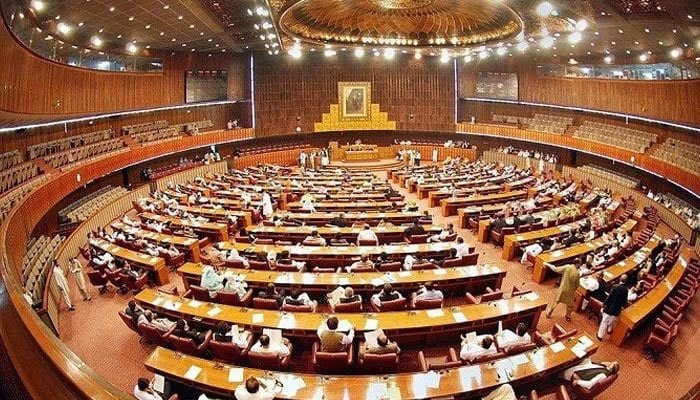Election for PM in first week of March
The first five days of the National and Provincial Assemblies would be devoted to the oath of members
ISLAMABAD: The new president will be elected by the beginning of the second week of next month since he has to be elected on or before March 8 as per the Constitution provisions.
The sources referred to Article 41 of the Constitution which reads: “41. The President 41. (1) There shall be a President of Pakistan who shall be the Head of State and shall represent the unity of the Republic. (2) A person shall not be qualified for election as President unless he is a Muslim of not less than forty-five years of age and is qualified to be elected as member of the National Assembly. 1[(3) The President 2* * * shall be elected in accordance with the provisions of the Second Schedule by the members of an electoral college consisting of— (a) the members of both Houses; and (b) the members of the Provincial Assemblies.] (4) Election to the office of President shall be held not earlier than sixty days and not later than thirty days before the expiration of the term of the President in office: Provided that, if the election cannot be held within the period aforesaid because the National Assembly is dissolved, it shall be held within thirty days of the general election to the Assembly. (5) An election to fill a vacancy in the office of President shall be held not later than thirty days from the occurrence of the vacancy:”
Well-placed sources told The News here late Friday evening that the question of the new president of the country and some other important slots also figured in talks between former president Asif Ali Zardari and former prime minister Shehbaz Sharif in Lahore in the evening.
The meeting took place on the advice of PMLN Quaid Nawaz Sharif. The PPP Chairman, Bilawal Bhutto Zardari, was also present on the occasion. The three leaders discussed the way forward to form a viable government to resolve the national issues.
The inaugural sittings of the National and provincial assemblies would likely be summoned to meet in the last week of the month. The notification of the elected members will be made by the Election Commission of Pakistan (ECP) in the third week of February. The independent members of assemblies would have three days at their disposal after the notification to join any political party.
The first five days of the National and Provincial Assemblies would be devoted to the oath of members and election of speakers and deputy speakers of the assemblies. It would be followed by the election of the prime minister in the case of the National Assembly and election of chief ministers in the provincial assemblies.
The sources pointed out that the election of 53 members of the Senate for six years will commence soon after the election of the prime minister. Senate Chairman and Deputy Chairman would be elected immediately after the oath of members of the Senate. The members of the Senate, National Assembly and provincial assemblies constitute the electoral college of the President.
Incumbent President Arif Alvi’s mandated period expired on September 9 last year and since then he has been occupying the office by virtue of relevant constitutional provision. The country will witness hectic parliamentary activities in the last week of February and the initial two weeks of March.
-
 Savannah Guthrie Expresses Fresh Hope As Person Detained For Questioning Over Kidnapping Of Nancy
Savannah Guthrie Expresses Fresh Hope As Person Detained For Questioning Over Kidnapping Of Nancy -
 ByteDance Suspends Viral Seedance 2.0 Photo-to-voice Feature: Here’s Why
ByteDance Suspends Viral Seedance 2.0 Photo-to-voice Feature: Here’s Why -
 Tom Hanks Diabetes 2 Management Strategy Laid Bare
Tom Hanks Diabetes 2 Management Strategy Laid Bare -
 Bad Bunny Wins Hearts With Sweet Gesture At Super Bowl Halftime Show
Bad Bunny Wins Hearts With Sweet Gesture At Super Bowl Halftime Show -
 Why Angelina Jolie Loves Her 'scars' Following Double Mastectomy
Why Angelina Jolie Loves Her 'scars' Following Double Mastectomy -
 ‘World Is In Peril’: Anthropic AI Safety Researcher Resigns, Warns Of Global Risks
‘World Is In Peril’: Anthropic AI Safety Researcher Resigns, Warns Of Global Risks -
 Meghan Markle Receives Apology As Andrew Puts Monarchy In Much Bigger Scandal
Meghan Markle Receives Apology As Andrew Puts Monarchy In Much Bigger Scandal -
 Catherine O’Hara Becomes Beacon Of Hope For Rectal Cancer Patients
Catherine O’Hara Becomes Beacon Of Hope For Rectal Cancer Patients -
 Nancy Guthrie: Is She Alive? Former FBI Director Shares Possibilities On 10th Day Of Kidnapping
Nancy Guthrie: Is She Alive? Former FBI Director Shares Possibilities On 10th Day Of Kidnapping -
 Siemens Energy Profit Surges Nearly Threefold Amid AI Boom For Gas Turbines, Grids
Siemens Energy Profit Surges Nearly Threefold Amid AI Boom For Gas Turbines, Grids -
 TikTok's ByteDance To Develop Advance AI Chips With Samsung
TikTok's ByteDance To Develop Advance AI Chips With Samsung -
 Princess Beatrice, Eugenie In Dilemma As Andrew, Fergie Scandal Continues
Princess Beatrice, Eugenie In Dilemma As Andrew, Fergie Scandal Continues -
 Tumbler Ridge School Shooting Among Canada’s Deadliest — Here’s Where It Ranks
Tumbler Ridge School Shooting Among Canada’s Deadliest — Here’s Where It Ranks -
 Suspect Detained As Authorities Probe Nancy Guthrie’s Abduction
Suspect Detained As Authorities Probe Nancy Guthrie’s Abduction -
 Tumbler Ridge Tragedy: Nine Killed, 25 Injured After School Shooting In British Columbia
Tumbler Ridge Tragedy: Nine Killed, 25 Injured After School Shooting In British Columbia -
 FDA Sends 'refusal-to-file' To Moderna Over New Flu Vaccine
FDA Sends 'refusal-to-file' To Moderna Over New Flu Vaccine




